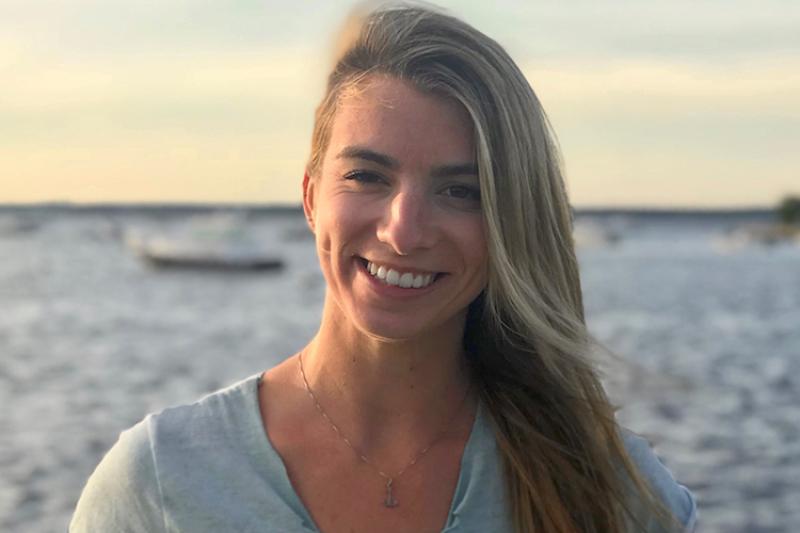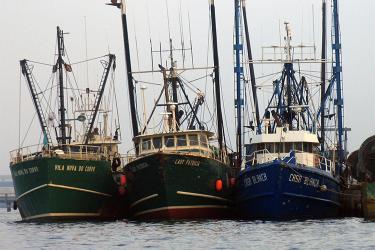Angela Silva is a social scientist for our science center’s Offshore Wind and Ecology Branch. She studies the interactions of offshore wind energy development and fisheries. Her research focuses on better understanding the effects of offshore wind energy development on the commercial and recreational fishing industries and the communities that depend on fishing and our nation’s seafood supply. Her home base is at our Narragansett Lab in Narragansett, Rhode Island.
Can you tell us a little about yourself—where you grew up, how you got interested in science, where you went to college?
I grew up in Massachusetts spending weekends boating, fishing, water skiing, and quahogging on Narragansett Bay in Rhode Island from our family boat, Weekend Fever. This is where my interest in marine science grew.
I went to the University of Rhode Island, earning a bachelor and masters degree in marine affairs. When I started, I thought I would focus on the natural sciences, but quickly realized I enjoyed studying the social sciences more. I specifically focused on the social, cultural, and economic well-being of commercial and recreational fishing communities. I was drawn to the fishing industry’s cultural identity, social structure, history, and fishing as a livelihood. My thesis research focused on commercial fishermen’s job satisfaction and perceived resilience and ability to adapt to fisheries management changes in New England.
Through connections made at the University of Rhode Island and NOAA Fisheries, I started my career as a contracted research assistant with the science center’s Social Science Branch. I worked on a number of human dimensions projects. This included fishing community vulnerability research, assisting in fisheries disaster socio-economic assessments post Hurricane Harvey and Sandy, graying of the fleet research, and 2018–2019 Commercial Fishing Crew Survey. This research has given me the opportunity to visit and spend time in more than 75 small and large U.S. fishing ports throughout my career, all unique and diverse from one another.
When I’m not working, I like to travel. I’m lucky to continue my love for boating and spending time on the water with my husband and 100-pound pet “mini” pig named Roxy.
What do you love most about your job or your career?
I enjoy the challenge of working on a new area of research. Right now that’s understanding offshore wind energy development interactions with fisheries. I also enjoy the opportunity to collaborate and partner with the fishing industry and diverse researchers regionally, nationally and internationally. The human aspect of fisheries has been increasingly incorporated into research objectives and the decision-making process. But there are still significant gaps and work to be done to increase the usability and value in decision making processes.
Collaborating and working with fishermen to solve research questions is one of my favorite parts of working in social sciences. Understanding fishing community needs and vulnerabilities from their perspective and knowledge is critical to the sustainability and future of our commercial fishing communities.
I also love the opportunity to communicate research at conferences and participate in international working groups, such as the International Council for Exploration of the Seas and their Working Group on Offshore Wind Development and Fisheries. This has opened up multiple opportunities in multidisciplinary research and has allowed me to visit new places such as Ireland and Spain.
What advice do you have for the next generation of women scientists about a career in fisheries and/or marine science?
Believe in yourself and your work, but be open to feedback and advice from others in your field. Make time to learn new things and be adaptable to working with multidisciplinary researchers. It’s easy to begin your career and keep to the skills you’ve learned in school and prior work. Being strict with yourself in setting aside time to learn new skills—something I still struggle with—will always open up more opportunities in the future. Take the time to get to know your colleagues’ and collaborators’ working styles. Be adaptable to the differences we all have in how we communicate with each other and conduct our work. Lastly, find a career path that gives you the work-life balance you need!






